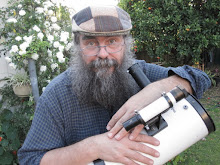Saturday, April 04, 2009
100 Hours of Astronomy - Day 3
 Why not hold an impromptu star party! The 24 hour Global Star Party (note, this site is currently down while Around the World in 80 telescopes is running, due to high server load, it will be back later) is on Saturday 4th April, all you need is a patch of sky and some friends and neighbours. If you are having a barbie with friends, just look up. Over invite the neighbours over into your back yard for a while. We will have a thousand screaming kids over for MiddleOnes birthday.
Why not hold an impromptu star party! The 24 hour Global Star Party (note, this site is currently down while Around the World in 80 telescopes is running, due to high server load, it will be back later) is on Saturday 4th April, all you need is a patch of sky and some friends and neighbours. If you are having a barbie with friends, just look up. Over invite the neighbours over into your back yard for a while. We will have a thousand screaming kids over for MiddleOnes birthday.Dust off that old telescope that has been lurking around in a cupboard gathering dust. What about recreating Galileo's adventures and explore the sky with binoculars or the old kids telescopes lying in the toybox.
You don't even really need telescopes or binoculars, just navigate your way around the sky and look for meteors or satellites. In Adelaide, at around 8:07 pm the Hubble Space telescope will glide through Gemini and underneath the Moon.
The Moon is in First Quarter phase, ideal for pointing telescopes at, and Saturn is high in the sky and is a big hit with everyone. Tonight (Saturday night) the Moon will be near the Beehive star cluster,which will make for nice viewing. You can even try and measure the movement of the Moon through the sky with reference to the Beehive.
Want to go out and do something special? Go to the Australian IYA site and look at the Calendar of Events. Check out your local astronomical societies or planetariums events. For example the Astronomical Society of South Australia is holding public viewings on Saturday. A planetarium Session at Uni SA, Mawsons Lakes, Saturday 4 April, 3pm, Admission: Adults $5, Children $3.50 and a public Viewing Night at the Grassed area, Black Forest, Forest Ave Saturday 4 April, 8:30pm, Admission: Adults $4, Children $1.
If you are up early in the morning, the moons of Jupiter are easily visible in binoculars (I was just looking at them before, and a satellite swept underneath Jupiter while I looked). And Venus returns to the morning sky, its dramatic crescent should be visible in binoculars.
So much to see! Have a great 100 hours of Astronomy.
Labels: International Year of Astronomy, Observational Astronomy



 Click to read about or order
Click to read about or order Click to read about or order
Click to read about or order Click to read about or order
Click to read about or order Click to read about or order
Click to read about or order




